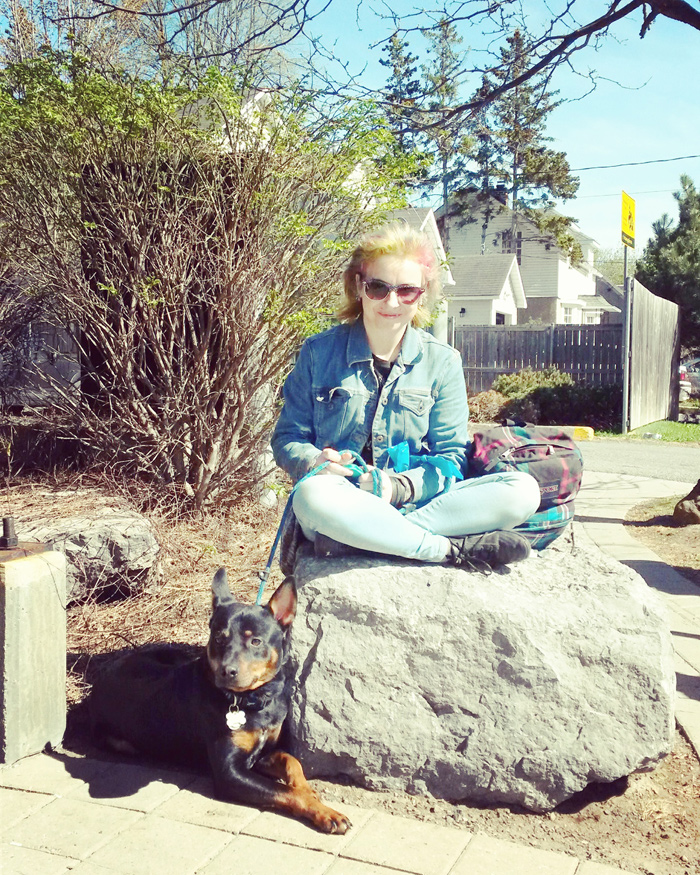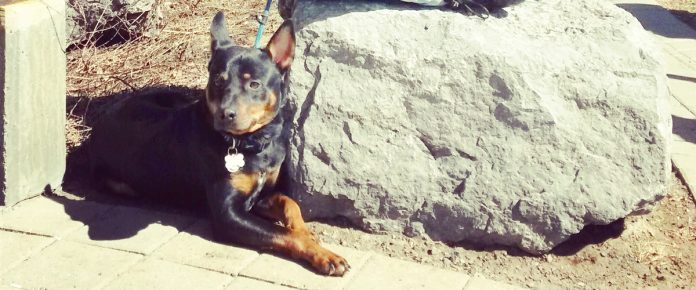By Bradley Turcotte –
When you are out enjoying the attractions and shops on Wellington Street West, you may encounter a street-involved person with a pet asking for help. You will likely assume they are neglecting their companion and your sympathies will be for the animal.
This is a common misconception, Dr. Michelle Lem, the founder and director of Community Veterinary Outreach (CVO), says.
“[Animals who are companions to disadvantaged people] have more exposure to environmental stimulation, social stimulation, exercise and play. The thing they really do lack is access to the veterinary care.”

Founded in 2003 as the Mission Veterinary Care program, CVO holds pop up clinics at Ottawa Salus on Scott Street with a staff of volunteers.
To qualify for CVO’s services, a pet owner must be homeless or vulnerably housed, receiving social assistance, referred by a social or health worker and not have a current relationship with a veterinarian.
The clinic sets up stations for animals for examinations, vaccinations and treatment for internal or external parasites. CVO connects clients with appointments for intensive procedures.
Additionally, the clinic features a pharmacy, trainers, and provides donated food, toys and essential items.
The clinic relies on the kindness of grocery stores and the Ottawa Humane Society for the bulk of its donations, says volunteer Cheryl Keaney, noting there always seems to be a shortage of cat food.
Carleton neuroscience and biology undergrad student and CVO volunteer, Dana Dusevic, entertained clients in the waiting area the day Kitchissippi Times visited the clinic and implores members of the community to pitch in.
“I would continue with the clinic regardless of if I go into vet medicine or not. Even if you are not comfortable with animals they have something else you can do here,” Dana says.
But CVO’s work is more than fur deep. Beginning in 2012, clients have access to mental health support, immunizations, oral care and dental referrals, smoking cessation, and harm reduction resources.
In addition to information, Carl Reinboth from Somerset West Community Health Centre dispenses naloxone kits, drug pipes and syringes at the pop-up events, noting he has seen an increased demand for methamphetamine pipes.
Isolation and loneliness contribute to drug abuse, Carl states, and pet ownership alleviates these conditions. Clients will feed their animal before themselves. Their pets are family.
“Dogs keep people happier. I know people that, because they have a dog, they know they can’t go to jail. The dog will get put down,” Carl says.

After graduating from the Ontario Veterinary College in 2001, Michelle travelled to New Zealand where she saw a stark difference in the expectation of vet care in comparison to Canada’s industry. Upon her return, Michelle felt compelled to contribute through her profession. The first mobile veterinary stations that visited the Ottawa Mission were “small” and treated about 12 animals, Michelle recalls. Public health agencies took notice and contacted Michelle with referrals.
“Initially I had concerns around the welfare of animals and people who couldn’t afford vet care. Over time we saw all these benefits to people we weren’t recognising. The stigma was incorrect around the welfare of animals but also around public perception that people who can’t afford them shouldn’t have pets,” Michelle says.
Clients of CVO face discrimination around poverty, addiction and mental health. Michelle and the team aim to provide services free of judgment and with PhD, “pride, honour and dignity,” as one client said.
This sensitivity and understanding is not the typical experience of the clinic’s client base.
Clients are anxious when they come in, observes Salus community developer and CVO greeter, Barb Szymanski.
“By the time they are walking out of here they have huge smiles. It feeds my soul for months afterwards. In every one of these cases, there is something unique about them,” Barb says.
Gratitude has moved clients to tears, adds Michelle.
“When we see a person on the street with a pet, for some reason we may have more empathy for the animal than the person. When we see another person who is vulnerable, it may make us feel uncomfortable. Maybe we see ourselves in them. We have that shared humanity whereas with an animal we can separate it. We misidentify then that that animal is suffering. We want to challenge that public perception. Chances are the person has had more trauma than the animal. They take very good care of their pets to the best of their ability.”
The next vet outreach clinic will take place at Salus Ottawa near the end of November.
Is there a non-profit group or volunteer that you think we should feature in KT? Do you know someone who is making our community a better place? Let us know! Send your suggestions to us via this form.
This feature is brought to you in part by Catherine McKenna, MP Ottawa Centre.
